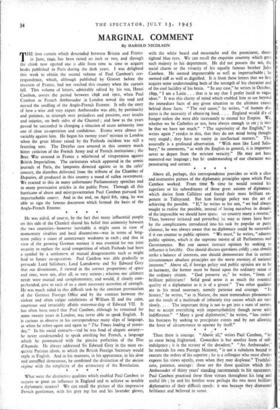Above all, perhaps, this correspondence provides us with a clear
and instructive picture of the diplomatic principles upon which Paul Cambon worked. From time is time he would remind his supetiors • or his subordinates' of those great axioms of diplomacy which derive from Callieres and found their most brilliant ex- ponent in Talleyrand. For him foreign policy was the art of achieving the possible. " If," he writes to his son, " we had always sought to realise the possible, instead of losing ourselves in dreanis of the impossible we should have spare. 3ur country many a reverse." Thus, however irritated and perturbed he may at times have been by the complications introduced into his task by popular or party clamour, he was always aware that no diplomacy could be successful if it ran counter to public opinion. " We must," he writes, " educate public opinion, which is the supreme master of all Parliaments and Governments. But one cannot instruct opinion by seeking to influence it forcibly. One should discuss questions coldly ; one should strike a balance of interests, one should demonstrate that in certain circumstances absolute principles are the worst enemies of national interests." Above all, if foreign policy and public opinion are to be in harmony, the former must be based upon the ordinary sense of the ordinary citizen. " God preserve us," he writes, " from all brilliant politicians! Solid good sense is as much the essential quality of a diplomatist as it is of a grocer." Two other qualities are to his mind necessary, namely patience and courage. " In history," he writes, " as in Nature, the most tremendous phenomena are the result of a multitude of infinitely tiny causes which act very slowly. ... The important thing is not to get into a state of nerves, but to accept everything with imperturbability though never with indifference." " Many a goc,c1 diplomatist," he writes, "has ruined his business by seeking to precipitate events and by not allowing the force of circumstance to operate by itself."
* * *


























 Previous page
Previous page